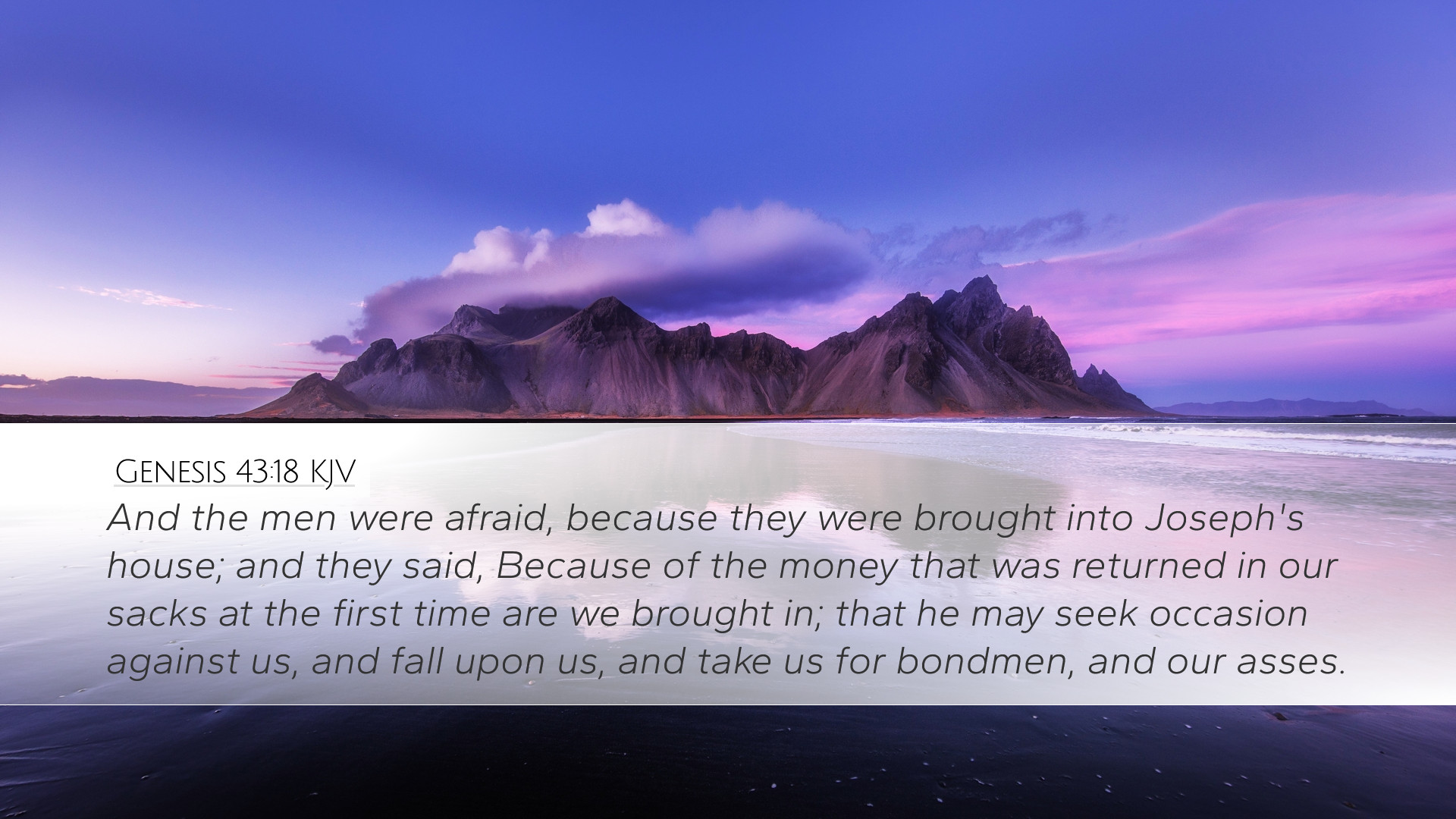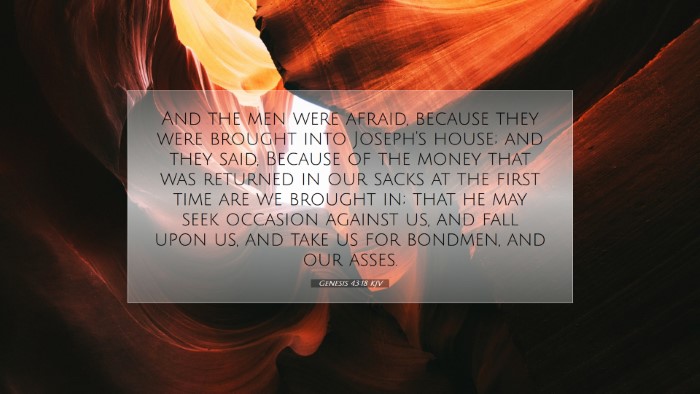Commentary on Genesis 43:18
Verse Context: Genesis 43:18 records the apprehension of Joseph's brothers as they return to Egypt with Benjamin, fearing that their previous encounter would lead to consequences. They are concerned about the repercussions of having been accused of being spies, which serves as a pivotal moment in the unfolding narrative of reconciliation and divine providence.
General Overview
This verse captures a moment filled with tension and the anxiety of the brothers, reflecting on their past actions and the perceived judgment from Joseph. The weight of their guilt and the uncertainty of their future elevate the emotional stakes of this narrative.
Commentaries Insights
Matthew Henry's Commentary
Matthew Henry emphasizes the theme of guilt and the consciousness of sin intertwined with human fear. He notes that the brothers were "troubled" by their circumstances, indicating their internal division between guilt for their treatment of Joseph and their hope for a favorable outcome. Henry points out that in times of distress, people often reflect on their past actions, which is significant for spiritual growth and understanding God’s providence.
Moreover, Henry suggests that such feelings of apprehension can drive individuals to seek God's mercy, reminding readers that fear can lead one to deeper faith. He reflects on how their worries reveal their character and the transformation occurring within them as they acknowledge their past wrongs.
Albert Barnes' Commentary
Albert Barnes provides a historical and exegetical perspective on Genesis 43:18. He discusses the significance of the brothers bringing Benjamin back to Egypt and the implications of their fears—their guilt over selling Joseph and how it has surfaced in their current circumstances. Barnes argues that their anxiety is largely due to the combination of their previous deceit and the authority of Joseph, whom they did not recognize as their brother.
Furthermore, Barnes highlights the role of divine providence, noting that their fears had a purpose—that they would ultimately lead them to confess their sins and seek reconciliation. The very obstacle of their past sin sets the stage for spiritual redemption and the fulfillment of God's promises through the lineage of Jacob.
Adam Clarke's Commentary
Adam Clarke sheds light on the emotional dynamics at play in this tense situation, drawing attention to the psychological state of the brothers. He articulates that their fear is not merely rooted in the possibility of punishment, but also in the implications of their past decision that diverged from familial loyalty and truth. Clarke interprets their feelings of dread as a convergence of conscience and consequence.
Moreover, Clarke emphasizes the broader theological implications of this passage, particularly in relation to God's providence. He suggests that although the brothers are fearful, this moment serves as a catalyst for transformation, not only of their characters but also of their situation. Clarke expresses that this verse is a prelude to the upcoming revelation of Joseph’s identity and highlights God's hand in orchestrating events that lead back to grace and forgiveness.
Theological Themes
- Divine Providence: The events unfolding around Genesis 43:18 showcase God's sovereignty. The brothers’ fears reflect human anxieties that can lead to divine encounters.
- Conscience and Guilt: The psychological aspect of guilt is a central theme here, with the brothers' feelings serving as a reminder of the weight of unresolved sin.
- Reconciliation: This verse sets the stage for eventual reconciliation, highlighting the importance of confronting the past in order to restore relationships.
Practical Applications
- Reflection on Past Actions: For pastors and theologians, this passage encourages reflective practice regarding personal and congregational histories.
- Understanding Fear in Faith: This verse teaches that fear can be a natural response to facing consequences but should lead believers to seek God’s counsel and mercy.
- Encouragement for Reconciliation: This serves as an important reminder of the need to confront and seek forgiveness for past wrongs, creating pathways for healing and redemption.
Conclusion
Genesis 43:18 encapsulates a significant moment of emotional turmoil and moral reckoning for Jacob’s sons. Engaging with the insights from Matthew Henry, Albert Barnes, and Adam Clarke allows readers to appreciate the depth of the narrative while recognizing the continuing relevance of its themes in contemporary faith contexts. The interplay of fear, guilt, and the anticipation of reconciliation serves as a powerful reminder of God’s sovereign grace moving through human frailty, encouraging believers toward reflection, repentance, and eventual restoration.


